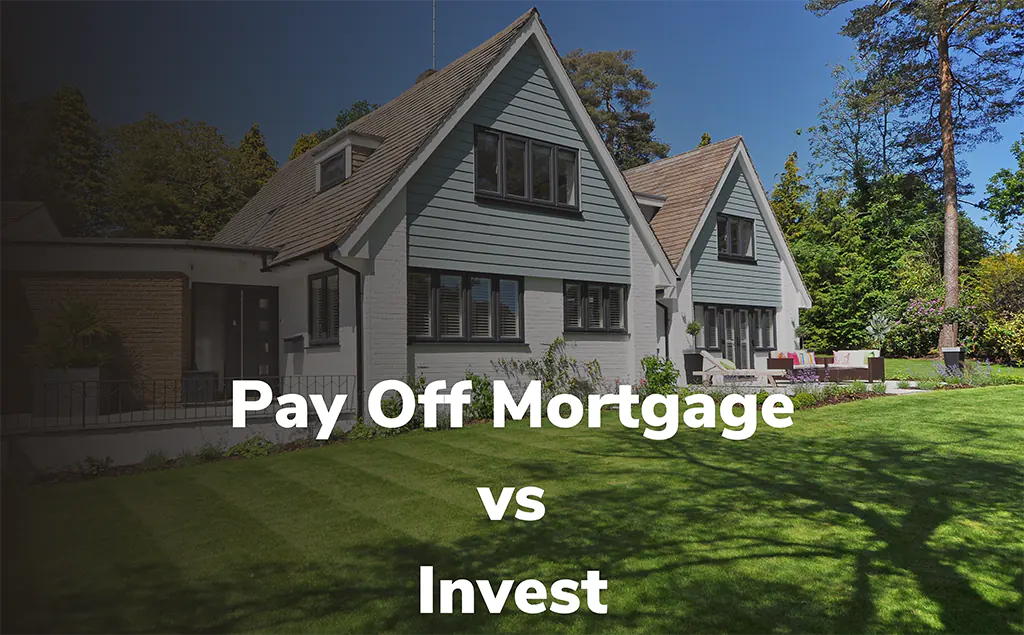UPDATED: May 13, 2022

Owning a home is an expensive proposition. In fact housing, transportation and food account for more than 60% of the average U.S. household’s budget.
With the high cost of purchasing and maintaining a home, it may not come as a surprise that most U.S. homeowners still have large balances on their mortgage loans. About 37% of U.S. homeowners in 2017 owned their house free and clear after sending in their last mortgage payment, according to data analysis from Zillow.
Table of Contents
FREE Mortgage/Refi Quotes Comparison
Compare Multiple Offers Instantly
As a homeowner, being “free and clear” from a mortgage sounds like the ideal situation because it eliminates those large monthly payments. But is being mortgage-free always beneficial? Is it something a homeowner should be aiming to achieve in the long run? The answer depends on the home owner and his or her financial situation.
Three Things to Do First
There are arguments for both paying down a mortgage and investing. Before doing either, a few other financial moves should be completed first.
Pay Down High-Interest Debt
For most people, high-interest debt means credit card debt. Other revolving lines of credit such as payday loans may also have high-interest rates. The interest rate on these debts makes the math simple. Most consumers will almost certainly save more in the long run by paying these high-interest debts before making extra payments on a mortgage.
The average interest rate for a credit card is about 16%. As a result, the high credit card interest will increase balances that are carried over from month to month faster than either mortgage interest or stock market gains so the modest prudent move is to pay it down first.
Build emergency savings
Seventy-eight percent of Americans live paycheck to paycheck. Even 9% of people who earn $100,000 or more still live paycheck to paycheck.
In 2018, an analysis of Federal Reserve data put the median savings account balance among Americans at $5,200, and the average savings was $33,766.49.
As a result, 40% of the U.S. population could not pay for an unexpected expense of $400 with cash or savings, according to a survey by the Federal Reserve. Most experts will recommend a liquid, safe emergency fund covering three to six months of living expenses. The best savings accounts can even provide decent interest on those funds without exposing it to market risk.
Max Out Your 401(k)s Employer Match
Many employers offer some degree of matching on their 401(k) plans. Because matching is effectively free money, employees should contribute at least enough to be able to earn that employer match.
If an employee is currently falling short of getting the maximum possible matching amount, perhaps because money has been too tight to defer too much of the paycheck, then it’s time to make it happen. If they can't, they needed to start budgeting yesterday.
Once these three priorities are met, it is time to address the question about paying off the mortgage early or to increase investments. Here’s when each option makes the most sense.
Pay off the Mortgage vs Investing
There are two big things to think about when making the decision to pay the mortgage early: The mortgage interest rate and the expected returns from investing. Determining which of these two rates is higher is the main factor in making the decision.
It is a decision between eliminating debt that charges interest, or investing money that hopefully will earn a return either by the appreciation of stocks and bonds and/or dividends and interest from bonds. The best option is the one that generates the higher rate.
In an average year, the stock market generally returns around 7%. By contrast, the average 30-year mortgage rate is around 4%. With $5,000 to spend, that would earn about $350 in the market, while $5,000 in mortgage debt will cost you around $165.
But of course, the market is very difficult to predict. That 7% figure may represent the average return over a long time, but in a given year it can be much higher or lower. For instance, in 2017 the Standard & Poor’s Index rose about 22%. But the next year the market actually fell, ending the year down 4%. If the $5,000 was invested at the beginning of 2017, the investor would have ended the year $1,100 richer, but the same investment made in early 2018 would have lost $200.
When to Choose to Pay Down the Mortgage
The best argument for paying down a mortgage is predictability. The homeowner knows exactly how much he or she will save, whereas investing in the market is not a sure money-maker.
There’s extra incentive to pay down the mortgage if your rate is particularly high. The greater the mortgage loan’s interest is above the current, national average, the stronger the case for paying it down. And with an adjustable rate mortgage, paying down the mortgage also helps blunt the possible impact of future rate increases.
Some investors also have more conservative investment portfolios than others. Many investors who are approaching retirement adjust their asset allocation accordingly to transfer more of the investments into bonds instead of stocks.
Even if the stock market goes up significantly, the returns will be significantly lower, perhaps lower than the investor’s mortgage rate. In this case, it’s probably best to pay down your mortgage instead of investing more.
For people nearing retirement with quite a bit of your mortgage to pay, it is probably wise to consider paying down the mortgage. That applies to people who are in their 50s or older.
Finally, the other factor working in favor of paying off the mortgage over investing is the psychological benefit some people will obtain when they are entirely debt-free. Some people simply cannot stand living with any kind of debt, even a mortgage. For people who become stressed or lose sleep over their mortgages, then paying it off early is probably the right decision.
Reasons to Invest Instead of Paying Down the Mortgage Early
In many cases, investing is the better option. As mentioned, the stock market’s average annual returns have historically been around 7%. This is over the long term, but that’s not an issue if the investor is younger with many years until retirement.
A young person who signs a 30-year mortgage has plenty of time to pay it off. Unless the mortgage is at a high interest rate, it may be best to think about investing. This is especially true if the loan has a fixed rate and won’t increase over time.
Take a homeowner with a $500,000, 30-year mortgage that carries an interest rate of 4%. The mortgage payment would be $2,378 per month. Over 30 years, the homeowner would pay $856,000, of which $500,000 would be principal payments and $356,000 would be interest payments. To pay the mortgage off in 10 years aggressively, it would require $607,000, of which $500,000 would be principal payments and $107,000 would be interest payments. That saves $249,000 in interest payments.
To pay off the mortgage in 10 years rather than 30 years would require increasing monthly payment to $5,055, an increase of $2,677 per month.
How much money would an investor expect to have after 30 years by investing $2,677 per month? Assuming a 7% annual return, the total would be approximately $3.3 million—which is a better-than-expected return than paying off the mortgage early. The math would be even more favorable towards investing in a scenario where the mortgage was paid off in 15 or 20 years rather than ten years.
Investors with high incomes should also consider investing. Investments that are held for one year or more are taxed at the dividend tax rate. This rate is lower than most of the federal income tax rates. That means taxpayers with a high regular income tax rate (22% or more) can ultimately save on taxes by building more wealth through investments instead of increasing their regular earnings from their full-time job.
Another thing to think about is inflation. As a homeowner ages, inflation combined with that fact that income will likely increase, means that mortgage payments will be easier later in the life of the mortgage. As the mortgage payments get easier, it also becomes easier to invest while still making the regular mortgage payments.On the other hand, if inflation is expected to decrease in the coming years, it may make sense to make extra mortgage payments now and favor investing as inflation decreases.
One More Consideration: Taxes
When homeowners file their income taxes, they may be able to deduct the interest paid on the mortgage. To do that, the taxpayer must itemize to claim the mortgage interest deduction. Previously, there was little incentive to make extra payments early in the life of a mortgage. However, the new tax law changed the calculus because fewer people were able to itemize after 2017.
The new tax law limited the state and local tax (SALT) deductions to $10,000 and as a result, many people have larger property tax bills for their homes. This won’t directly affect the mortgage payments but it increases the overall cost of owning a home.
If you were already on the edge of affordability, refinancing or even moving may make sense. Residents in the high-tax states of California, New Jersey, New York, Illinois, Texas and Pennsylvania will feel the new limit the most. People who are now looking for a house now should factor in SALT.
On the flip side, there are taxes on investment earnings. As mentioned above, those tax rates are generally lower for people with high incomes and hold the investments for the long term. If you can itemize and deduct mortgage interest via the mortgage, then keeping your mortgage may be more advantageous than investing.
The big exception is that you don’t need to pay taxes on earnings from a retirement account. So if you plan to invest through an IRA or employer-sponsored plan like a 401(k), then investing will be the best option.
FREE Mortgage/Refi Quotes Comparison
Compare Multiple Offers Instantly






Leave a Reply